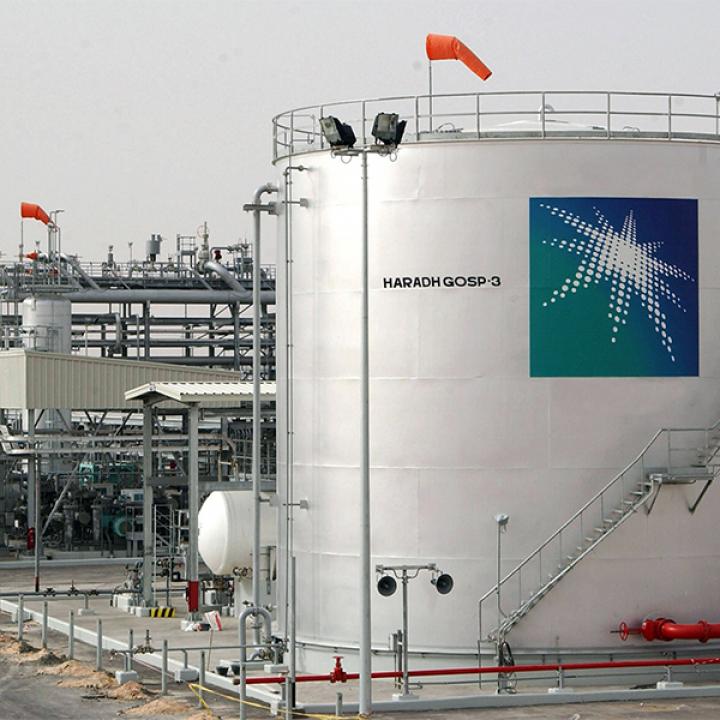

The long-anticipated stock selloff has finally been green-lit, but doubts remain about just how much it will help to economically transform the kingdom.
On November 3, Saudi Arabia formally announced plans for the partial selloff of its state-owned oil company, to begin sometime next month. The successor of the Arabian American Oil Company, originally established by U.S. firms, Saudi Aramco is easily described in superlatives. It is the largest oil producer in the world, with the lowest production costs, and has a reputation for being extremely well run, all of which have helped it become the most profitable company on the planet.
Yet being situated in the Middle East, having key installations vulnerable to Iranian attack, and selling oil to countries increasingly concerned about climate change are hardly factors conducive to favorable long-term prospects. The kingdom simultaneously claims to be diversifying away from its dependence on oil, adding to the uncertainty about its approach. The details of the announcement therefore need context:
Reasons for delay. The initial public offering is seen as very much the project of Crown Prince Muhammad bin Salman (aka MbS), the de facto Saudi ruler who wants to use the proceeds to fund his “Vision 2030” plan for modernizing the kingdom. The months of delay since reports surfaced that he and other officials were entertaining the idea of an IPO are attributed to hesitation about revealing the company’s financial details, as well as concern that its assets might become vulnerable to legal action, particularly if Saudi Arabia is found to bear any official responsibility for the 9/11 terrorist attacks.
Likely valuation. The company’s total value is also under question. MbS suggested it is worth $2 trillion, which means that selling off a mere 5 percent would result in a $100 billion inflow into Saudi government coffers. Analysts have expressed doubts about whether this valuation is credible, however, suggesting figures in the range of $1.5-1.8 trillion, even as low as $1.1 trillion. At one point, Riyadh mentioned selling off 5 percent per year for ten years then stopping so as to maintain majority control, but its current plans are unclear.
Sparse details. The November 3 announcement confirmed predictions that the IPO will first appear on the Saudi domestic exchange Tadawul rather than the New York, London, or Tokyo stock markets, which are arguably better equipped to handle such a large offering. No information has been given on the number of shares that will be available, but reports suggest between 1 and 2 percent. There is no indication about share price either, nor a specific date given for the launch. The crown prince’s advisors still seem to be seeking a way of hitting the $2 trillion headline figure that he favors.
Market valuation. Regardless of what MbS wants, the market will eventually decide such matters, especially once shares are being traded in exchanges other than Tadawul. For the domestic launch, the government is seeking commitments from foreign sovereign wealth funds (perhaps Russia and China) as well as rich Saudi individuals, reportedly including some of those who were detained in the Riyadh Ritz-Carlton in late 2017 for alleged corruption and profiteering. More generally, the government is said to be encouraging Saudi citizens to take out bank loans in order to buy shares. Investors may be able to take an immediate profit when trading begins, as happened when Britain privatized state-owned utilities in the 1980s, yet a price increase is by no means guaranteed.
Domestic investment opportunities. Transforming the Saudi economy requires creating around one million new jobs in the next few years for the many young people entering the workforce. Vision 2030’s showpiece project is NEOM, a planned $500 billion, ultra-high-tech economic zone in the northwest part of the kingdom near Egypt and Jordan. Yet there will be comparatively few jobs for humans in the robot-filled facilities envisioned for NEOM, which so far only has a new airport and some palaces completed.
Foreign interest. A major foreign investment conference just ended in Riyadh, with better attendance than last year, when the murder of dissident journalist Jamal Khashoggi cast a shadow over the proceedings. Even so, reporting suggests that foreign executives were more interested in securing fee income in new fundraising or investment assistance for overseas projects rather than actually putting money into the kingdom.
Saudi investment abroad. Some of the IPO’s proceeds will likely be invested outside the kingdom, although picking winners has proved a challenge for Riyadh. The kingdom has shown a loss so far on the $4 billion its Public Investment Fund put into Uber, and its support for the investment fund of Japan’s SoftBank looks dubious in light of the recently failed WeWork IPO, where SoftBank was heavily committed.
For these and other reasons, the Aramco IPO’s progress will be watched carefully by international financial markets as well as foreign governments, who often find themselves either troubled, puzzled, or both by the kingdom’s decisionmaking processes. In a cover story this week, the Economist described the selloff as “the world’s biggest and wildest IPO,” and characterized MbS as “an autocratic royal with blood on his hands”—hardly the type of press Riyadh wants to be getting so close to such a major investment milestone.
Simon Henderson is the Baker Fellow and director of the Bernstein Program on Gulf and Energy Policy at The Washington Institute.



